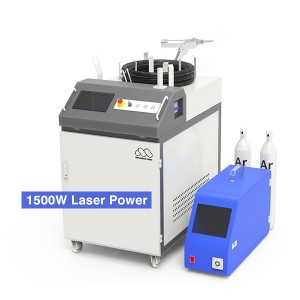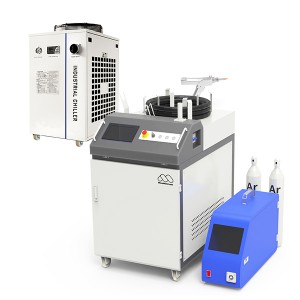5 Laser Welding Quality Problems & Solutions
Meet different situation for laser welder
With high efficiency, high precision, great welding effect, easy automatic integration, and other advantages, laser welding is widely used in various industries and plays a pivotal role in metal welding industrial production and manufacturing, including in the military, medical, aerospace, 3C auto parts, mechanical sheet metal, new energy, sanitary hardware, and other industries.
However, any welding method if not mastered its principle and technology, will produce certain defects or defective products, laser welding is no exception. Only a good understanding of these defects, and learning how to avoid these defects, to better play the value of laser welding, processing a beautiful appearance, and good quality products. Engineers through long-term experience accumulation, summed up some common welding defects of the solution, for industry colleagues' reference!
1.Cracks
The cracks produced in laser continuous welding are mainly hot cracks, such as crystallization cracks, liquefied cracks, etc. The main reason is that the weld produces a large shrinkage force before the complete solidification. Using the wire feeder to fill wires or preheating the metal piece can reduce or eliminate the cracks shown durng laser welding.


2.Pores in weld
Porosity is an easy defect in laser welding. Regularly the laser welding pool is deep and narrow, and metals normally conduct the heat very well and super-fast. The gas produced in the liquid molten pool does not have enough time to escape before the welding metal cooling down. Such case is easy to lead to the formation of pores. But also because the laser welding heat area is small, the metal can cool down really fast, the resulting porosity shown in laser welding is generally smaller than the traditional fusion welding. Cleaning the workpiece surface before welding can reduce the tendency of pores, and the direction of blowing will also affect the formation of pores.
3.The splash
If you weld the metal workpiece too fast, the liquid metal behind the hole pointing to the center of the weld has no time to redistribute. Solidifying on both sides of the weld will form a bite. When the gap between two pieces of work is too large, there will be insufficient molten metal available for caulking, in which case welding edge biting will also occur. At the ending stage of laser welding, if the energy drops too quickly, the hole is easy to collapse and resulting in similar welding defects. Better balance power and moving speed for laser welding settings can solve the generation of edge biting.


4.Undercut
The splash produced by laser welding seriously affects the weld surface quality and can contaminate and damage the lens. The spatter is directly related to the power density, and can be reduced by properly reducing the welding energy. If the penetration is insufficient, the welding speed can be reduced.
5.The collapse of the molten pool
If the welding speed is slow, the molten pool is large and wide, the molten metal amount increases, and the surface tension is difficult to maintain the heavy liquid metal, the weld center will sink, forming collapse and pits. At this time, it is necessary to reduce the energy density appropriately to avoid the collapse of the molten pool.

Video Display | Glance for handhold laser welding machine
Recommended laser welder
Any questions about the operation of Welding with laser?
Post time: Apr-07-2023



